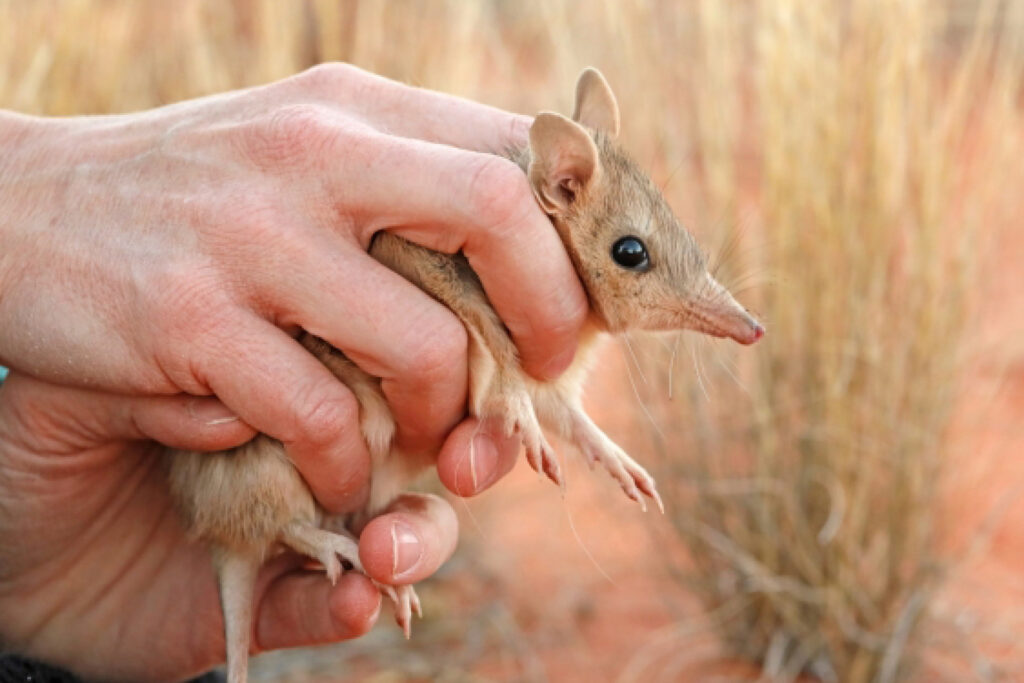Frankston Rotarians are proudly supporting Wild Deserts, a conservation project reintroducing extinct species to the Sturt Desert.
By Lee Anne Smith
Rotary Club of Frankston, Vic
The Rotary Club of Frankston has had a long record of offering practical assistance for conservation projects located in isolated parts of the country. First, at Arid Recovery, a 123 km2 wildlife reserve at Olympic Dam near Roxby Downs, SA, and more recently with its current project, Wild Deserts, at Fort Grey, NSW, since 2019.
In June 2022, 15 intrepid Frankston Rotary members and partners set out on the arduous 3,000km round trip to the far north-west corner of NSW to offer a hand to the Wild Deserts Project.
The conservation project involves supporting scientists who are charged with the responsibility of reintroducing seven locally extinct species to the Sturt Desert. Wild Deserts is a partnership between UNSW Sydney, Ecological Horizons, and the
NSW Government.

More species of mammals have died out in Australia in the past 200 years than anywhere else in the world, so this optimistic, big-idea project is incredibly important. The ideas that are being developed also offer a ray of hope across the world, where other similar terrains can utilise the science and techniques developed.
The project involves providing a safe haven for the reintroduced mammals by building specialised feral-proof fences that exclude rabbits, cats and foxes from two large ‘exclosures’ (keeping animals out rather than trapping them in). The north and south feral-free fenced enclosures are named Thipa, meaning ‘alive’ in the Wangkumarra language, and Mingku, which means ‘good’ or ‘happy’ in the Maljangapa language.
Adjacent to the exclosures is the Wild Training Zone. This is a 104km2 zone that acts like a halfway house. The reintroduced species can be exposed to low levels of predators and the population can be trained to develop behaviours that will offer them some protection from the feral predators. It is within this area that techniques can be developed to help with the management of the reintroduced mammal species.
“More species of mammals have died out in Australia in the last 200 years than anywhere else in the world, so this optimistic, big-idea project is incredibly important.”
“Our crest-tailed mulgara populations have rocketed up to between 160 and 240 individuals,” said Wild Deserts Project Coordinator Dr Reece Pedler. “We originally only started with 19, translocated from wild populations in South Australia in August 2020.
Populations of four native mammal species – bilbies, crest-tailed mulgaras, Shark Bay bandicoots and golden bandicoots – are now booming since their recent reintroduction to Sturt National Park.
Up until recently, bilbies, mulgaras and the Shark Bay bandicoots were locally extinct in the region – but annual trapping survey results show the conservation work is paying off.
“Given each female can have up to eight young and conditions have been booming from rainfall in early 2021 and again in January 2022, it has been the perfect opportunity for mulgaras to grow their population.”
Bilbies are also increasing their numbers, now six-times the number of the initial 10 translocated.

“It’s now estimated up to 60 bilbies are bouncing around their exclosures, including female bilbies bred at Wild Deserts who are now having pouch young of their own,” said Wild Deserts principal ecologist Dr Rebecca West.
The Shark Bay bandicoots haven’t wasted time either, doubling the initial release within only six months. All of the six females translocated have already had two litters each since arriving at Wild Deserts in May 2021.
“It was fantastic to catch new young bandicoots so soon after the translocation,” says Dr West. “It’s a great indicator of the project’s success so far,” Dr West said.
“It is really the icing on the cake to find new female bilbies that are also breeding.”
Last year, the major work for Rotary Club of Frankston members involved converting two sheds at Fort Grey into an education centre for School of the Air. The space will be used by the children of staff at Wild Deserts and those from surrounding stations. Transport boxes for bilbies and bandicoots were constructed, as well as handling bags for small animals. Club members have previously been involved in the construction of accommodation spaces for visiting scientists, welding mobile firefighting equipment and the installation of water tanks, antennas and two-way radio.
For more information on the Wild Deserts project, visit rotaryfrankston.org.au
